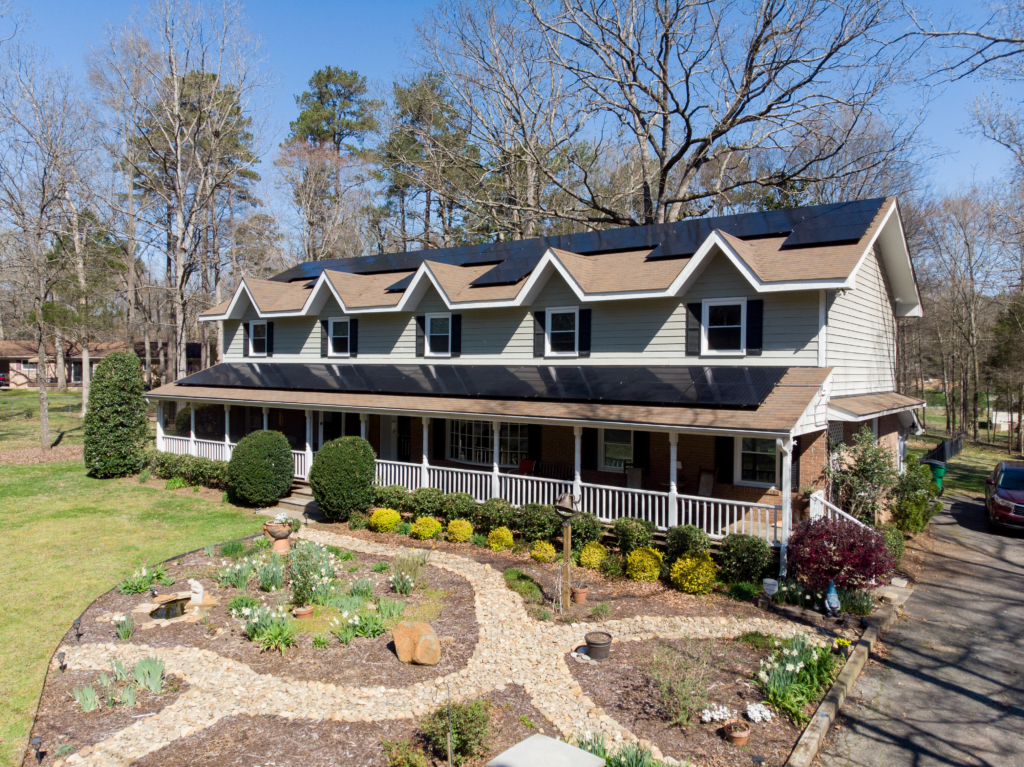Mount Your Solar on the Ground
Mount Your Solar on the Ground
Mount your solar on the ground! Solar power systems have become both more efficient in recent years – producing more power relative to space used – and more affordable. The latest innovation to benefit customers in the Charlotte area doesn’t have to do with the panels at all, but rather with the mounting systems that hold panels up and attach them to the ground.

Renu Energy Solutions, a solar installer for 11 years, has started to use a new means of mounting solar installations in a yard, and its saving clients money and making for a smoother, more desirable install process. To understand how transformational this is for their business it helps to look at how the solar service company used to approach “ground mounted” solar.
Renu Energy Solutions’ Director of Operations Andrew O’Donnell describes the difference that his team found in mounting a ground mount system: “We were used to either using ballast blocks or having to bring in an earth-mover to dig, but that’s all different now. For one thing we don’t have to deal with custom steel fabrication. The earth anchors make this system a much more flexible solution, and we don’t feel like we’re wrecking the look of the grass and terrain on the property. In fact now when we’re done it looks like we were never even there, except that there’s a solar installation secured in the ground.”
![]()
![]()
Other than shallow leveling for the system’s legs and a small trench to run cable back to the building using the solar service, no digging is needed thanks to the patent-pending innovation that works just by drilling 40-inch-deep holes. Renu Energy Solutions reports significantly greater customer satisfaction with these installations, who in turn are more likely to recommend it to their friends, and points to the ease of disassembly and relocation as a selling point for these movable solar projects. To recap the benefits:
- Save time and money
- Adjustable legs can install on uneven terrain
- Earth anchors provide hold-down capacity to meet code requirements
- No need to involve geotechnical experts
- No heavy equipment
- No ground screws
- No specialized skilled labor outside our usual team
Renu Energy Solutions President Jay Radcliffe beams, “For literally years, we’ve been thinking we’d like to find a system to mount solar on the ground less invasively and more easily.
Send us a request today to meet with a solar representative familiar with this mounting system about your solar goals.

Frequently Asked Questions About Solar for Your Home or Business:
How exactly does going solar and a solar system itself work?
How many solar panels do I need for my home?
Roof-size/available space: When we look at the size of your roof and the space available, we gather data that tell us the maximum number of solar panels your home or site can hold and we even consider shading. We use a software “Suneye” which takes a 360 picture of your roof and we use this photo to determine if your home is a good candidate for solar.
Energy Usage: When we determine energy usage we look at your past electrical bills from over the course of a year to make sure your system isn’t too big or too small.
Your Budget: We take your budget seriously and most importantly, we want you to be satisfied with our services. We take your feedback on how much you want to spend so that we can size your system appropriately.
What is solar net-metering?
Does Duke Energy offer net-metering?
Curious about the cost of a home solar system?
Ready to Own Your Own Energy?
Speak to Us Today!
